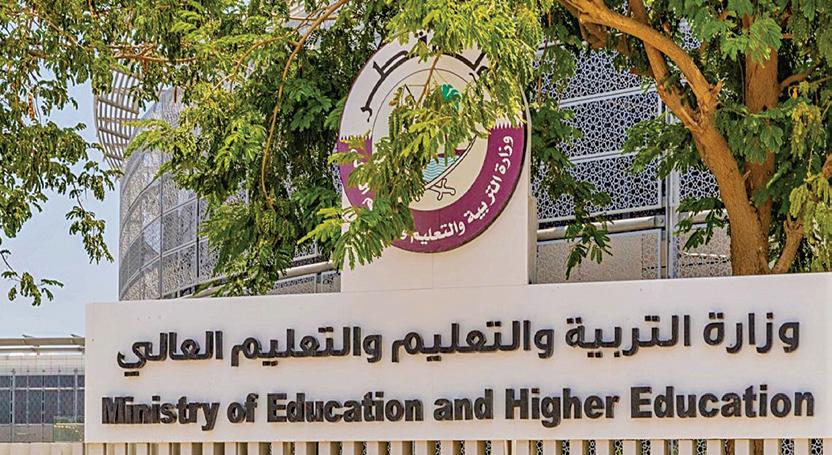
4 minute read
New Evaluation Policy
By Ola Diab
A new evaluation policy has been implemented at public schools to minimise the number of student failures.
The Ministry of Education and Higher Education (MoEHE) implemented a new evaluation policy in May 2023 in order to minimise the number of student failures at public schools, which are also known as government schools, beginning from the 2022–23 academic year.
According to the Assistant Undersecretary for Evaluation Affairs at MoEHE, Khalid Abdullah Al Harqan, the new changes to the evaluation policy were implemented to help students who face difficulties in learning with support programmes in classrooms to improve their performance in difficult subjects. This is one of the many steps MoEHE has recently taken to assist pupils with support programmes in classrooms in a bid to boost their performance in challenging areas.
With the latest evaluation policy, ‘a student of grade 12 (day, adult education, parallel) who is absent (with an acceptable excuse) from the first-semester exam in one or more subjects is allowed to apply for the supplementary exam,’ said Al Harqan.
‘A student of grade 12 who is absent (with an acceptable excuse) from the exam of the first semester and supplement in one or more subjects is not allowed to take the exam at the end of the second semester in these subjects, and he is allowed to appear in the exam of the second round,’ he added.
Students in years or grades one through 12 who take the first round of exams and face a failing grade in one or more topics will now be able to apply for the second round of exams in those subjects.
According to Al Harqan, a student in grade 12 who passes the first-round exam and wants to raise his overall grade to point average, improve his mark in one or more subjects, or both, is permitted to apply for the second-round exam in the same academic year in which he passed.
‘The student who fails in one subject will be promoted if he needs not more than 10 marks for passing. The student who fails in two subjects is promoted if he needs not more than 12 marks for passing,’ he said. ‘They are distributed over the two subjects according to the student’s status for passing.’
According to the Head of the Examination Affairs Department at MoEHE, Ibrahim Al Mohannadi, the evaluation policy has been changed so as to have no impact whatsoever on students’ academic performance or the nation’s educational outcomes.
The Evaluation Policy
Each country has an evaluation and assessment policy. There are a variety of measures to evaluate students, teachers, school leaders, schools and education systems. These tools are essential to understanding better how well students are learning, to provide information to parents and society at large, and to improve school, school leadership and teaching practices.
Evaluation is a critical process to building a worldclass educational system that meets the growing needs of the country. High standards and guiding capacity are integral to a growing and robust system. In Qatar, all aspects of the educational system are evaluated – students, teachers and schools.
The evaluation process is based on pre-defined criteria established by MoEHE. Parents depend on the evaluation of schools to make decisions regarding the education of their children. Schools rely on this evaluation to improve deficiencies. Decision makers, educational researchers and investors rely on these evaluation tools to make informed decisions.

MoEHE deploys a number of systems to assess students' performance throughout their academic pathways. These systems include the formative classroom assessment, mid-term and final exams, high school examinations and the national and international assessments. The aim of those integrated assessments is to identify the students' academic achievement levels, deficiencies and remedial plans based on well-established scientific fundamentals.
Assessment of Grades 1 – 3
In these phases, the assessment is centred on the class teacher's observation using standardised assessment tools such as short classroom assessment, classroom participation and activities, homework and assignments and projects. The purpose of using these tools is to measure the student performance in basic skills and knowledge against certain criteria in addition to achievement tests.
Assessment of Grades 4 – 11
The score distribution in these grades varies depending on the National Assessment Policy, since grade 6 and grade 9 are subject to the National Assessment System. Evening and home school students in all grades are assessed by 100% for each subject per term.
National assessments
Assessments are applied to Arabic, English and Mathematics for grade 3, and Arabic, English, Mathematics and Science for grade 6 and grade 9.
High school certificate
The high school examinations serve as evidence of students completing the high school phase. Students are assessed based on their achievement in Arabic, English, Mathematics, Chemistry, Biology, Social Studies, Islamic Studies and other elective subjects.
The score of semester or term 1 and term 2 serve as a basis for passing the high school exams. The total score is calculated at 50% for term 1 and 50% for term 2.
A student is considered to have 'passed' (high school certificate holder) if she/he attends the exams of all subjects in the two terms and secures a minimum of 50% for each subject by the end of both terms. Students who fail in a maximum of three subjects or fail to attend the exams for an acceptable reason are allowed to sit for make-up exams.
International Exams
MoEHE measures how well students in Qatar are performing compared with their counterparts from around the world. Qatar has been participating in international assessments such as:
• The Programme for International Student Assessment (PISA)
• Key Features of TIMSS 2023

• Facts for Parents/Guardian - Grade 4 TIMSS 2023
• Facts for Parents/Guardian - Grade 8 TIMSS 2023
• Progress in International Reading Literacy Study (PIRLS).
A new dress code
In some public or government schools, students are required to wear uniforms; at other public or government schools, students are required to wear modest and traditional clothing, with most males wearing the traditional Qatari clothing: thobe and ghitra
The thobe and ghitra will become the official uniform for Qatari students between sixth and 12th grade at Qatar Foundation (QF). The decision will come into effect starting from the next academic calendar 2023–24 and applies to all QF pre-university schools except the Qatar Leadership Academy, which has it own school uniform.
Non-Qatari students will have the option to either stick to the regular uniform or wear the traditional Qatari attire. The policy will not affect female students.











